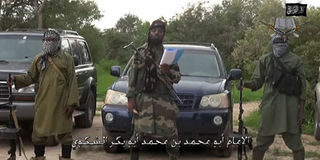Boko Haram seeks publicity with caliphate

A screen-grab from a video shows the leader of the Nigerian Islamist extremist group Boko Haram, Abubakar Shekau (centre), delivering a speech at an undisclosed location. AFP PHOTO |
What you need to know:
- Boko Haram leader Abubakar Shekau, who has previously expressed support for IS leader Abu Bakr al-Baghdadi, did not give further details, leading to debate about exactly what he meant.
- Boko Haram, blamed for more than 10,000 deaths since 2009, has long voiced a desire to create a strict Islamic state within mainly Muslim northern Nigeria, which has an existing network of emirs whom Shekau has denounced, and a parallel system of Islamic law.
Boko Haram’s declaration of a caliphate in Nigeria may have been prompted by the attention heaped on Islamic State (IS) militants in Iraq, experts said, but the pronouncement may have deeper roots.
The Nigerian group announced in a video obtained by AFP on Sunday that the captured town of Gwoza in northeastern Borno state was under an Islamic caliphate, drawing comparisons with a similar declaration by IS in June.
Boko Haram leader Abubakar Shekau, who has previously expressed support for IS leader Abu Bakr al-Baghdadi, did not give further details, leading to debate about exactly what he meant.
Analysts suggested that IS may have inspired his statement after grabbing international headlines in recent months by seizing parts of Iraq and Syria in a brutal onslaught.
The United States has described the group as the strongest-ever Islamist threat with its “apocalyptic end of days” ideology.
Boko Haram in comparison is thought to be a modestly-funded local uprising made up of poor youths with little tactical training.
By evoking a Nigerian caliphate, experts suggested Shekau was trying to raise his own profile rather than submit to like-minded extremists in the Middle East.
“I think right now Shekau’s moves are coming from a desire to emulate IS,” said David Cook, a religious studies professor at Rice University in Houston who studies Boko Haram.
His statement was largely about “trying to get more media attention” after global focus shifted from its widely condemned abduction of more than 200 schoolgirls in April to the territorial ambitions of Islamic State, he added.
Shehu Sani, an expert on religious violence in northern Nigeria who has brokered peace talks with Boko Haram, agreed that Shekau’s recent moves appear to have been shaped by the IS example.
Boko Haram, blamed for more than 10,000 deaths since 2009, has long voiced a desire to create a strict Islamic state within mainly Muslim northern Nigeria, which has an existing network of emirs whom Shekau has denounced, and a parallel system of Islamic law.
But, Sani added, Boko Haram did not have a plan to achieve its goal before now. “What is happening in Iraq has given them direction,” Sani told AFP.
Previously, the militants thought they should “overrun the whole country before they declare their (jihadist) republic” but after watching IS “they have taken a more gradualist approach,” he added.
Boko Haram’s tactics have seen a dramatic shift in recent months from hit-and-run strikes to attacking and holding areas in the remote northeast.
Establishing which parts of northeast Nigeria have fallen into rebels hands is difficult, however, with travel dangerous and prolonged fighting hitting mobile phone networks. The military maintains that Nigeria’s sovereignty is intact but its claim stands at odds with multiple reports indicating that Boko Haram controls several towns in Borno and at least one in neighbouring Yobe state.
In tracing the historical origins of Boko Haram, some academics have pointed to the Sokoto Caliphate, an 19th century Islamic state established by Usman Dan Fodio.





